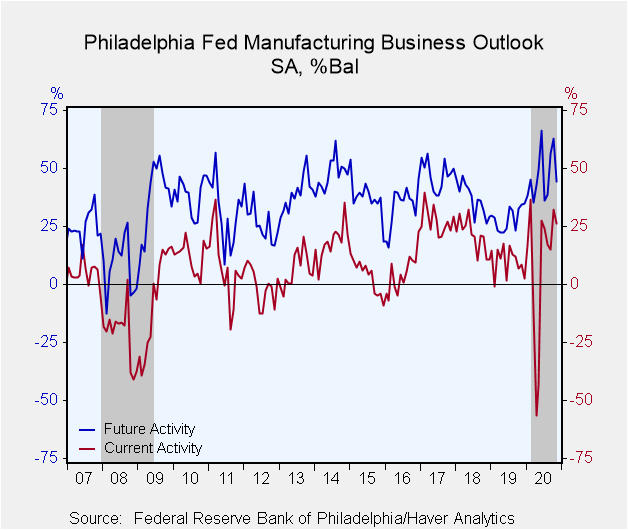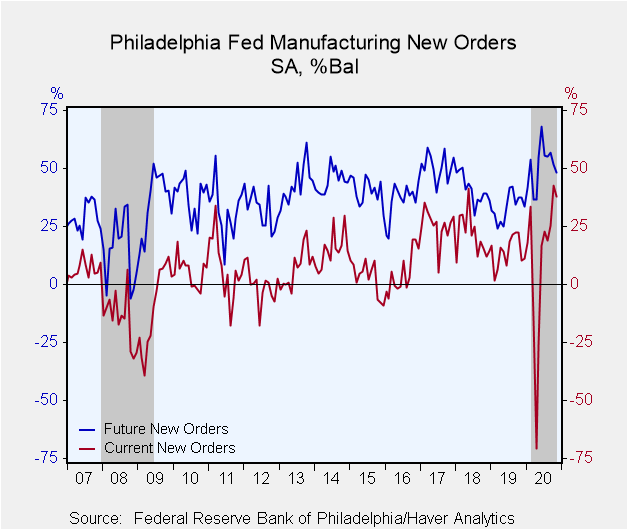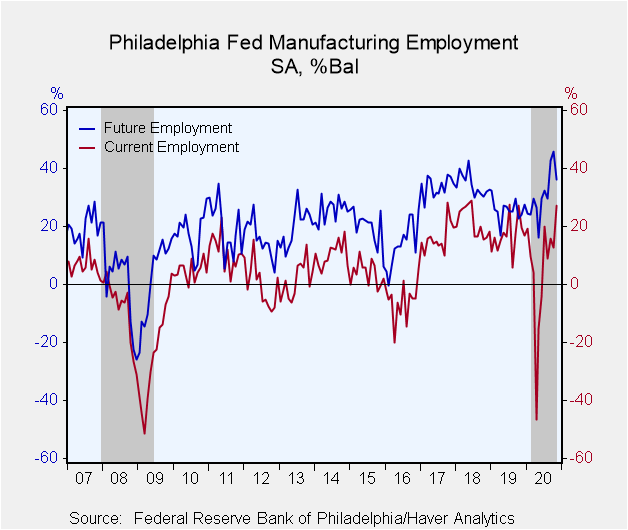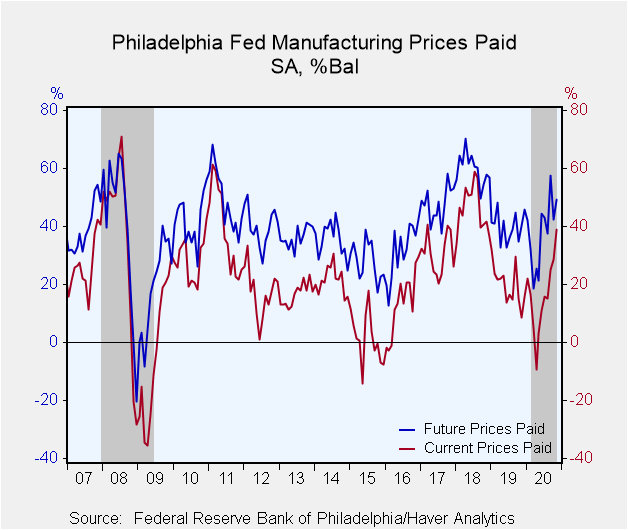 Global| Nov 19 2020
Global| Nov 19 2020Philadelphia Fed Manufacturing Index Slips During November
by:Tom Moeller
|in:Economy in Brief
Summary
• Headline index reverses some of October's improvement. • Component declines are broad-based. • Expectations weaken. The Federal Reserve Bank of Philadelphia reported that its General Factory Sector Business Conditions Index has [...]
• Headline index reverses some of October's improvement.
• Component declines are broad-based.
• Expectations weaken.
The Federal Reserve Bank of Philadelphia reported that its General Factory Sector Business Conditions Index has fallen in November to 26.3% after rising to 32.3% in October. The index has now been in positive territory for six consecutive months, indicating business expansion. The Action Economics Forecast Survey expected a reading of 22.0. The percentage of firms reporting an improvement in business activity fell to 42% from 47% in October while the percentage reporting weaker conditions held steady this month at 15%.
Haver Analytics calculates an ISM-Adjusted General Business Conditions Index using the same underlying components that comprise the ISM index. This measure weakened to 60.1 from the near record 61.5 in October.
The new orders index fell to a still strong 37.9% after strengthening to 42.6% last month. The shipments index similarly declined. A lessened 41% of respondents reported an increase in shipments. The delivery time index also recorded a slight decline. Working the other way, unfilled orders surged and inventories rose.
On the labor front, the employment index improved to 27.2% in November from 12.7% in October. It was the fifth consecutive month in positive territory and the highest level since July 2019. The average workweek index rose slightly to 25.7% from 25.3% in October. It remained the highest reading in just over two years.
The index of prices paid strengthened 38.9% in November from 28.5% in October. It was the highest level in exactly two years. An increased 39% of respondents paid higher prices while none paid less. The prices received index surged to the highest level since February 2019.
The Philadelphia Fed also surveys expectations for business activity in six months. The Future Activity Index weakened to 44.3% in November, a three-month low. Component declines were widespread, including new orders, shipments and employment.
The survey panel consists of 150 manufacturing companies in the third Federal Reserve District (which consists of southeastern Pennsylvania, southern New Jersey and Delaware). The diffusion indexes represent the percentage of respondents indicating an increase minus the percentage indicating a decrease in activity. The ISM-adjusted figure, calculated by Haver Analytics, is the average of five diffusion indexes: new orders, shipments, employment, delivery times and inventories with equal weights (20% each). Each ISM-adjusted index is the sum of the percent responding "higher" and one-half of the percent responding "no change."
The figures from the Philadelphia Federal Reserve dating back to 1968 can be found in Haver's SURVEYS database. The expectation from the Action Economics Forecast Survey is available in AS1REPNA.
| Philadelphia Fed - Manufacturing Business Outlook Survey (%, SA) | Nov | Oct | Sep | Nov'19 | 2019 | 2018 | 2017 |
|---|---|---|---|---|---|---|---|
| ISM-Adjusted Business Conditions | 60.1 | 61.5 | 57.3 | 54.5 | 55.5 | 57.7 | 57.2 |
| General Factory Sector Business Conditions | 26.3 | 32.3 | 15.0 | 8.4 | 9.9 | 20.9 | 27.3 |
| New Orders | 37.9 | 42.6 | 25.5 | 10.1 | 14.1 | 21.0 | 25.3 |
| Shipments | 24.9 | 46.5 | 36.6 | 13.4 | 16.9 | 22.8 | 26.7 |
| Unfilled Orders | 22.2 | 8.3 | 0.4 | 8.2 | 7.7 | 7.0 | 11.8 |
| Delivery Time | 18.0 | 20.5 | 12.2 | 9.7 | 9.4 | 9.5 | 10.6 |
| Inventories | 1.8 | -2.5 | -10.8 | -3.5 | 5.1 | 7.2 | 2.8 |
| Number of Employees | 27.2 | 12.7 | 15.7 | 19.7 | 16.9 | 21.5 | 16.1 |
| Average Workweek | 25.7 | 25.3 | 7.8 | 6.8 | 9.8 | 15.9 | 14.9 |
| Prices Paid | 38.9 | 28.5 | 25.1 | 8.5 | 19.7 | 46.1 | 30.4 |
| Expectations - General Business Conditions; Six Months Ahead | 44.3 | 62.7 | 56.6 | 34.4 | 28.4 | 36.8 | 47.1 |
Tom Moeller
AuthorMore in Author Profile »Prior to joining Haver Analytics in 2000, Mr. Moeller worked as the Economist at Chancellor Capital Management from 1985 to 1999. There, he developed comprehensive economic forecasts and interpreted economic data for equity and fixed income portfolio managers. Also at Chancellor, Mr. Moeller worked as an equity analyst and was responsible for researching and rating companies in the economically sensitive automobile and housing industries for investment in Chancellor’s equity portfolio. Prior to joining Chancellor, Mr. Moeller was an Economist at Citibank from 1979 to 1984. He also analyzed pricing behavior in the metals industry for the Council on Wage and Price Stability in Washington, D.C. In 1999, Mr. Moeller received the award for most accurate forecast from the Forecasters' Club of New York. From 1990 to 1992 he was President of the New York Association for Business Economists. Mr. Moeller earned an M.B.A. in Finance from Fordham University, where he graduated in 1987. He holds a Bachelor of Arts in Economics from George Washington University.
More Economy in Brief
 Global| Feb 05 2026
Global| Feb 05 2026Charts of the Week: Balanced Policy, Resilient Data and AI Narratives
by:Andrew Cates










